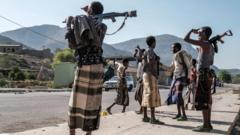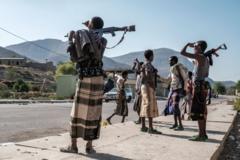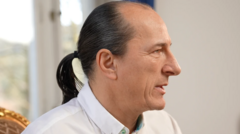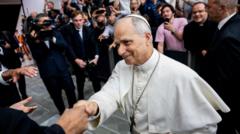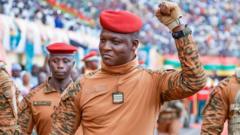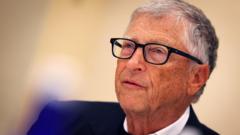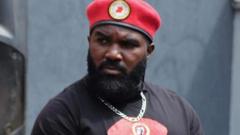This release follows negotiations between Gabon’s coup leader and Angola’s President, marking a significant change in the political landscape of Gabon.
Former Gabon President Ali Bongo and Family Released from Detention, Now in Angola
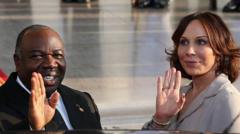
Former Gabon President Ali Bongo and Family Released from Detention, Now in Angola
Ali Bongo, ousted in a coup, and his family have been freed and relocated to Angola after spending two years in detention.
Former Gabonese President Ali Bongo, who was overthrown during a coup in 2023, has been freed from detention and is now in Angola, as revealed by the Angolan government. Accompanying Bongo are his wife, Sylvia, and son, Noureddin, who had faced corruption allegations prior to their release. While they have yet to comment on these charges, Sylvia's lawyer has labeled her imprisonment as illegal.
The family's release follows a recent diplomatic engagement between Angolan President João Lourenço and current Gabonese leader Brice Oligui Nguema, the general who led the coup against Bongo and later won the presidency in a landslide election last month. Gabonese prosecutor Eddy Minang noted that the release is provisional due to the health conditions of Sylvia and Noureddin, with the court proceedings against them still ongoing.
Upon arriving in Angola, images released by the presidency show Bongo being welcomed at the airport with Sylvia beside him. Bongo, who led Gabon for 14 years after succeeding his father Omar Bongo, was reportedly under house arrest following his ousting, while his family remained incarcerated until their recent release.
Gabon’s opposition leader, Alain Claude Bilie-by-Nze, criticized Nguema for yielding to international pressures, asserting that the release of the Bongo family symbolizes an abuse of power. Sylvia and Noureddin stand accused of embezzling government funds, with Sylvia facing additional charges including forgery and money laundering.
The former ruling family has been accused by the public of hoarding wealth amidst widespread poverty in Gabon, despite the nation’s oil riches. Recent political developments have seen Gabon readmitted to the African Union after a suspension due to the coup, with AU Chairman Mahmoud Ali Youssouf expressing hopes for a constitutional restoration across Africa.
As neighboring West African countries face their own challenges in transitioning power back to civilian rule, the Gabonese case highlights ongoing tensions and the changing dynamics of governance on the continent.
The family's release follows a recent diplomatic engagement between Angolan President João Lourenço and current Gabonese leader Brice Oligui Nguema, the general who led the coup against Bongo and later won the presidency in a landslide election last month. Gabonese prosecutor Eddy Minang noted that the release is provisional due to the health conditions of Sylvia and Noureddin, with the court proceedings against them still ongoing.
Upon arriving in Angola, images released by the presidency show Bongo being welcomed at the airport with Sylvia beside him. Bongo, who led Gabon for 14 years after succeeding his father Omar Bongo, was reportedly under house arrest following his ousting, while his family remained incarcerated until their recent release.
Gabon’s opposition leader, Alain Claude Bilie-by-Nze, criticized Nguema for yielding to international pressures, asserting that the release of the Bongo family symbolizes an abuse of power. Sylvia and Noureddin stand accused of embezzling government funds, with Sylvia facing additional charges including forgery and money laundering.
The former ruling family has been accused by the public of hoarding wealth amidst widespread poverty in Gabon, despite the nation’s oil riches. Recent political developments have seen Gabon readmitted to the African Union after a suspension due to the coup, with AU Chairman Mahmoud Ali Youssouf expressing hopes for a constitutional restoration across Africa.
As neighboring West African countries face their own challenges in transitioning power back to civilian rule, the Gabonese case highlights ongoing tensions and the changing dynamics of governance on the continent.


